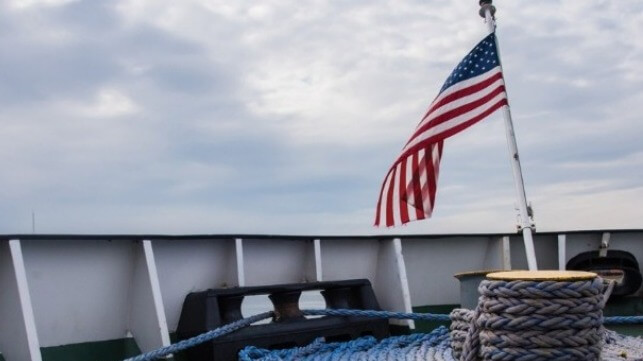Sweeping Legislative Approach Proposed to Revitalize U.S. Merchant Marine

A new legislative initiative launched by two U.S. Senators and two U.S. members of the House of Representatives and broadly supported within the maritime industry seeks to provide a comprehensive approach to revitalize the U.S. maritime industry and all its related parts. Calling it the first wide-ranging approach to the problems of the industry, the legislation seeks to address the shortage of shipbuilding capacity and capabilities, the lack of U.S. flagged ships, and support mariners with improved training and credentialing programs overseen by a White House-level position, the Maritime Security Advisor.
According to the sponsors of the SHIPS for America Act (Shipbuilding and Harbor Infrastructure for Prosperity and Security), it entails the first all-encompassing strategic approach looking at all the challenges and providing a framework toward restoring the American merchant marine. They said it would create jobs in shipbuilding and at sea as well as rebuild the merchant marine and support national security.
“We’ve always been a maritime nation, but the truth is we’ve lost ground to China, who now dominates international shipping and can build merchant and military ships much more quickly than we can,” said Senator Mark Kelly of Arizona, a U.S. Navy veteran and the first U.S Merchant Marine Academy graduate to serve in Congress. “The SHIPS for America Act is the answer to this challenge. By supporting shipbuilding, shipping, and workforce development, it will strengthen supply chains, reduce our reliance on foreign vessels, put Americans to work in good-paying jobs, and support the Navy and Coast Guard’s shipbuilding needs.”
The comprehensive bill is 344 pages and contains many familiar elements proposed before, such as a requirement for U.S. exports of LNG to be transported on U.S. vessels, but it also creates a new infrastructure for oversight and accountability, overhauls the finance and incentive methods of the shipbuilding and the industry, uses cargo preference requirements and sealift capacity to spur shipbuilding, addresses the lack of seafarers with training and credentialing overhauls, and seeks to reform regulation to support the maritime industry. (Senator Kelly's office created at 17-page synopsis.)
A few other rider issues have already been proposed including legislation to increase the general limit of maritime liability to not exceed 10 times the value of a vessel and its cargo for the owner of a foreign vessel. U.S. shipowners would have liability up to the value of the vessel and its freight. It also reintroduces a bill for a maritime fuel tax parity.
Senator Todd Young of Indiana, another of the sponsors, said, “The bottom line now is America needs more ships. Shipbuilding is a national security priority and a stopgap against foreign threats and coercion.”
The legislation sets a goal of expanding the number of U.S.-flagged vessels in international commerce to 250 ships in 10 years. They contend that currently there are just 80 U.S.-flagged vessels in international commerce. The target is within the creation of the Strategic Commercial Fleet Program driven by cargo preference requirements including increasing to 75 percent (from 50 percent) the requirement for the U.S. government to transport cargo on U.S.-flagged commercial ships. They also propose a further requirement that 25 percent of agricultural cargo would have to travel on U.S.-flagged vessels. This would include specialty crops and food products exported by the Department of Agriculture under international aid programs. There is also a provision to require 10 percent of U.S. imports from China to travel of U.S.-flagged ships.
Financial programs include establishing a 25 percent investment tax credit for shipyard investments. The legislation would also overhaul the MARAD financing programs to create a revolving fund for financing construction and vessel repair. Training would be enhanced with investments in the U.S. Merchant Marine Academy and the state schools, along with a recruiting program and overhauls to the credential programs of the U.S. Coast Guard.
Coordinating this comprehensive all-government approach would fall to the position of Maritime Security Advisor within the White House. This new position would lead an inter-agency Maritime Security Board tasked with making whole-of-government strategic decisions for how to implement a National Maritime Strategy.
“Today, less than 200 oceangoing ships fly the American flag, the SHIPS for America Act will empower our shipyards and marine merchants to uphold our country’s status as a leader in the maritime industry,” said Representative John Garamendi of California who with Representative Trent Kelly of Mississippi introduced the legislation into the U.S. House.
“The American Maritime Partnership applauds the sponsors of the SHIPS for America Act for their focus on the maritime needs of our nation,” said Jennifer Carpenter President of the partnership. “We appreciate that the legislation builds on the strong foundation of the Jones Act to further strengthen and revitalize the U.S. maritime industry.”
AMP is one of the more than 80 organizations supporting the legislation. The unions and trade associations, shipowners, shipbuilders, and suppliers to the industry have all endorsed the initiative.
No comments:
Post a Comment